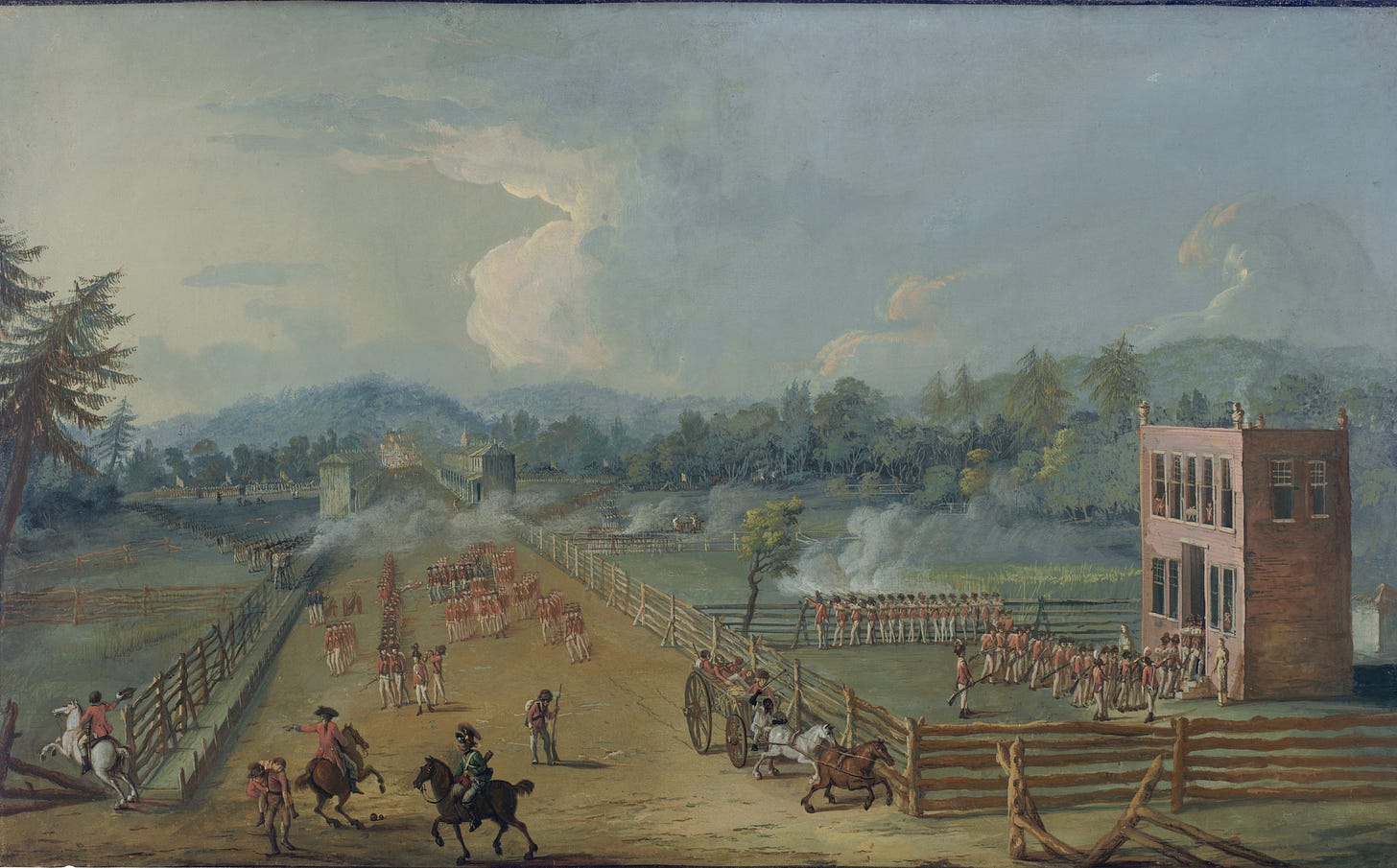TDIH: Battle of Germantown
Washington’s army had launched a surprisingly tough attack at a time when it was believed to be down and out.
On this day in 1777, Americans lose the Battle of Germantown—at least technically. In an odd sort of way, Germantown was a morale booster, too. Washington’s army had launched a surprisingly tough attack at a time when it was believed to be down and out.
The conflict at Germantown occurred in the wake of American losses at Brandywine and Paoli. It also followed the British occupation of Philadelphia on September 26, 1777. Not too long after that occupation, General William Howe decided to position a large portion of his forces at Germantown, several miles outside of Philadelphia. He wanted to be able to defend the city from an advance by Washington’s forces.
In the meantime, Washington’s army was in rough shape. They lacked supplies and even some of the basic necessities. But, as the Pennsylvania Historical and Museum Commission describes, “their morale was good and they were still full of fight.” When Washington heard that Howe had cut his troops at Germantown in half, he thought he could still score a victory. He settled upon a daring plan to attack the British.
Four American columns were to approach the British from different directions. They were then to attack simultaneously at 5 a.m. in the morning.
Interestingly, Howe received intelligence suggesting that an American attack was coming, but he still did not think that Washington’s army was much of a threat. He thus failed to fortify his position sufficiently and left his men exposed.
On the American side, General John Sullivan was leading one column that was to attack Howe’s center. These forces arrived at their appointed location on time. Unfortunately, the other columns had become lost and disoriented by a thick fog that had descended upon the area. Sullivan launched his attack at 5 a.m., believing that the other forces were where they were supposed to be.
They weren’t.
Sullivan’s forces nevertheless did well at first—and they were helped by General Anthony Wayne and his men, who were determined to avenge the massacre at Paoli. Howe’s men were in retreat. As he watched his men, Howe was horrified. He reportedly called out to them: “For shame, Light Infantry! I never saw you retreat before. Form! Form! It's only a scouting party.” Some of the British took refuge in a stone mansion in the area, Cliveden. Sullivan continued his advance for more than a mile. For a time, it seemed that Americans might win.
Unfortunately, the fog was still causing disorientation. The smoke was thick and some Americans came under friendly fire. Other aspects of the operation began to suffer from the fact that some columns were arriving too late. Making matters worse, Washington took the advice of Henry Knox and gave an order to attack the British soldiers holed up at Cliveden. It was a bad idea.
Americans tried to storm Cliveden, with the support of cannon, but the building proved to be a strong fort and it did not go well at all. Americans suffered heavy losses and were eventually forced into a retreat. Washington’s army had suffered more than 1,000 killed, captured and wounded. By comparison, the British had suffered slightly over 500 killed and wounded.
The battle seemed like a defeat. But, the French took note of American courage and resilience during these losses. They also took note when Americans won at Saratoga not too long afterwards. Taken in combination, these series of events encouraged the French to join in the Revolution as an ally of the new American nation.
How surprising! And interesting. The series of defeats ended up working to Americans’ advantage.
Sources can always be found on my website, here.



I have learned so much about this War from you and these posts. I cannot thank you enough.
I find it amazing that the American forces had high morale after the defeats they had suffered and coupled with little to eat and insufficient clothing and armament, it is remarkable that the rank and file would remain willing to fight.
However, the fight for freedom requires fortitude and the Americans had much fortitude. Convincing the French to become allies had to have a significant positive impact for the American forces.
I have a question. What was the population of the original Colonies in 1777? To lose 1,000 men of fighting age had to have been a huge proportion of the overall American forces and even of the total population. Our forefathers were fierce and determined. Thank you Tara. May the Alogarithems bend to our favor.